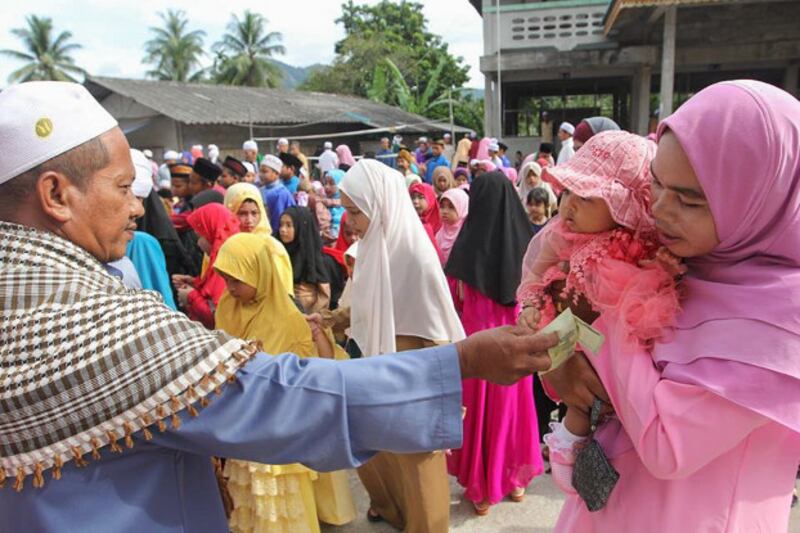As hundreds of thousands of Muslims marked Eid-ul-Adha in Thailand’s troubled Deep South on Wednesday, Thai authorities said they killed three suspects in recent days while thwarting insurgent plots to disrupt the religious holiday.
Authorities said they also arrested 10 suspects in two counter-insurgent operations mounted during the past week in Thailand’s southern border region.
Since the Islamic fasting month of Ramadan ended in mid-June, at least 17 people have been killed in attacks blamed on separatist rebels in the predominantly Muslim and Malay Deep South. On Wednesday, there were no reports of violence.
One of the operations took place on Tuesday, the eve of Eid-ul-Adha, when a combined force of soldiers and police shot and killed a suspected insurgent during a firefight in Mayo, a district of Pattani province, officials said.
The incident occurred near an Islamic school in Namsai village as the security force traded shots with six rebel suspects, killing one of them. The remaining five were arrested, according to officials.
“These men came into the neighborhood to plan attacks to disrupt Eid-ul-Adha but our intelligence officers were able to track them down first,” police Col. Komkrit Srisong, the chief of Mayo police station, told BenarNews.
“We tried to arrest them but they returned fire, so both sides clashed.”
On Aug. 16, during the first operation, security forces surrounded a house in Sa-ae Nai village in Yala province’s Krong Pinang district, where seven suspected rebels were meeting to plot attacks related to the Eid holiday, authorities said.
“While five of them surrendered, two others did not and they used rifles to shoot back, so officials returned fire and killed them,” Lt. Gen. Piyawat Nakwanich, the Thai army commander for the 4th Army Region, which covers the Deep South, told reporters as he visited the scene of the shootout in Yala.
All of the suspects were wanted for crimes, he said, adding the two slain men had led an attack on a police checkpoint in the same district, wounding 12 officers on April 3, 2017.
Police Col. Narawi Binwae-arong, the chief of police in Krong Pinang, said an intelligence tip-off, which indicated that the group was meeting to plot holiday attacks, led to the operation.

Deadly spate
The Deep South, which encompasses Pattani, Yala, and Narathiwat provinces as well as four districts of Songkhla province, was relatively peaceful during Ramadan.
But since the holy month ended more than two months ago, at least 26 attacks carried out by insurgents have killed 17 people and injured another 23 across the region, according to official figures compiled by BenarNews from police and military reports.
The attacks included the Aug. 11 roadside shooting deaths at point-blank range of a Buddhist mother and her 14-year-old daughter as they were returning home from a flea market in Narathiwat’s Bacho district.
Police Maj. Gen. Manas Sikasamat, who oversees the Narathiwat provincial police bureau, blamed insurgents.
“The shootings of the mother and daughter were related to insurgents. We arrested three suspected gunmen who gave us useful information,” Manas told BenarNews without elaborating.
The area where the shooting occurred was also the site of a roadside ambush on July 18, when a gunman fired on a pickup truck with an M-16 assault rifle, killing the driver and injuring a passenger, officials said.
And on the same day the mother and daughter were gunned down in Narathiwat, a sniper killed a paramilitary ranger with five rounds fired from 100 meters (328 feet) away in Pattani’s Panare district, authorities said.
Sunai Phasuk, a Thai researcher for Human Rights Watch who has decades of experience in the Deep South, said more killings had taken place lately in the region “due to the distorted religious teachings that attacking non-believers or Malay supporters of the government is a noble act.”
He said Barisan Revolusi Nasional (BRN), the largest and most potent of the region’s various rebel groups, were responsible for much of the violence. Nearly 7,000 people have been killed in violence across the Deep South since the decades-old insurgency flared up again in 2004.
“Why doesn’t the Malay community condemn them when the BRN claims they represent the Malay Patani [people]? The Malay Muslims must come out to condemn the BRN and refuse violence as a way to end the problem,” Sunai told BenarNews.
Meanwhile, for the past three years Thailand’s military government and MARA Patani, an umbrella group representing difference insurgent groups and factions, have been holding peace talks brokered by Malaysia. But, so far, both sides have not agreed to a geographically limited ceasefire, which is seen as a linchpin to advancing the process.
The talks seem to have ground to a halt, at least temporarily, partly because of the recent change of governments in neighboring Malaysia, according to a Thai official who asked not to be named.
In late June, Mahathir Mohamad, Malaysia’s new prime minister, indicated that his government would carry on with brokering the southern Thai peace negotiations.
“Yes … yes, we are,” Mahathir said June 25 in response to a question on this from a BenarNews reporter.
But when the reporter asked whether the new government would replace Ahmad Zamzamin bin Hashim as facilitator of those talks with a different person, Mahathir responded, “We will announce later.”
